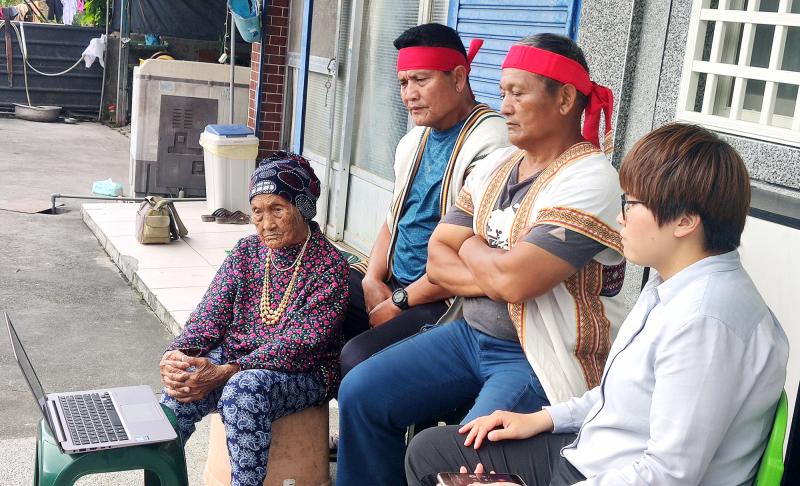The Control Yuan yesterday called for the expungement of a conviction for illegal hunting against Tama Talum, a Bunun man who was last year pardoned by President Tsai Ing-wen (蔡英文) after the charges were deemed “partly unconstitutional.”
Despite the pardon, “justice has not been served” for Tama Talum, who is also known as Wang Kuang-lu (王光祿) in Chinese, Control Yuan Member Wang Mei-yu (王美玉) said in a press release.
Tama Talum was in 2015 sentenced to three-and-a-half years in prison for using an illegal rifle and killing protected species without permission, but the Council of Grand Justices (now the Constitutional Court) later deemed the verdict partly unconstitutional, resulting in the case being referred back to the Supreme Court.

Photo: CNA
Tama Talum avoided prison after Tsai pardoned him “out of respect for indigenous people’s traditions,” amid fierce criticism of the rules governing indigenous peoples’ hunting rights.
Wang Mei-yu, who in 2015 initiated an investigation into the case following a public outcry over the verdict, recently published a report suggesting that the Control Yuan petition the prosecutor-general to pursue an extraordinary appeal to overturn Tama Talum’s criminal conviction.
The Control Yuan endorsed the report after a meeting of its Committee on Judicial and Prison Administration Affairs, and to communicate with the Ministry of Justice to facilitate an extraordinary appeal by the prosecutor-general, Wang Mei-yu said.
Tama Talum’s conviction indicated that the judicial system failed to recognize indigenous peoples’ constitutionally protected rights to practice hunting culture, she said.
The investigation exposed long-standing issues involving “inadequate” legal protections for indigenous peoples’ hunting rights and regulations of hunting weapons, she said.
Wang Mei-yu said similar issues had long been a source of friction between indigenous communities and other Taiwanese, adding that the verdict would exacerbate such conflicts if it is not overridden.
Reasserting that hunting is a cultural right of indigenous hunters, the Council of Grand Justices handed down a mixed ruling in Tama Talum’s case.
The court reaffirmed the constitutionality of requiring indigenous people to use only traditional, “self-made” firearms, but ordered the legislature to revise the rules that define such guns.
Meanwhile, the court also found that requiring indigenous people to apply for permission before hunting was constitutional, but nullified a series of administrative regulations requiring hunters to apply at least five days in advance of “non-regular” hunts and to list the species and number of animals they are planning to kill in advance.
To date, the laws and regulations deemed unconstitutional have not been amended, but the Council of Agriculture and other government agencies have held discussions on possible revisions.

Alain Robert, known as the "French Spider-Man," praised Alex Honnold as exceptionally well-prepared after the US climber completed a free solo ascent of Taipei 101 yesterday. Robert said Honnold's ascent of the 508m-tall skyscraper in just more than one-and-a-half hours without using safety ropes or equipment was a remarkable achievement. "This is my life," he said in an interview conducted in French, adding that he liked the feeling of being "on the edge of danger." The 63-year-old Frenchman climbed Taipei 101 using ropes in December 2004, taking about four hours to reach the top. On a one-to-10 scale of difficulty, Robert said Taipei 101

Nipah virus infection is to be officially listed as a category 5 notifiable infectious disease in Taiwan in March, while clinical treatment guidelines are being formulated, the Centers for Disease Control (CDC) said yesterday. With Nipah infections being reported in other countries and considering its relatively high fatality rate, the centers on Jan. 16 announced that it would be listed as a notifiable infectious disease to bolster the nation’s systematic early warning system and increase public awareness, the CDC said. Bangladesh reported four fatal cases last year in separate districts, with three linked to raw date palm sap consumption, CDC Epidemic Intelligence

Two Taiwanese prosecutors were questioned by Chinese security personnel at their hotel during a trip to China’s Henan Province this month, the Mainland Affairs Council (MAC) said yesterday. The officers had personal information on the prosecutors, including “when they were assigned to their posts, their work locations and job titles,” MAC Deputy Minister and spokesman Liang Wen-chieh (梁文傑) said. On top of asking about their agencies and positions, the officers also questioned the prosecutors about the Cross-Strait Joint Crime-Fighting and Judicial Mutual Assistance Agreement, a pact that serves as the framework for Taiwan-China cooperation on combating crime and providing judicial assistance, Liang

US climber Alex Honnold left Taiwan this morning a day after completing a free-solo ascent of Taipei 101, a feat that drew cheers from onlookers and gained widespread international attention. Honnold yesterday scaled the 101-story skyscraper without a rope or safety harness. The climb — the highest urban free-solo ascent ever attempted — took just more than 90 minutes and was streamed live on Netflix. It was covered by major international news outlets including CNN, the New York Times, the Guardian and the Wall Street Journal. As Honnold prepared to leave Taiwan today, he attracted a crowd when he and his wife, Sanni,